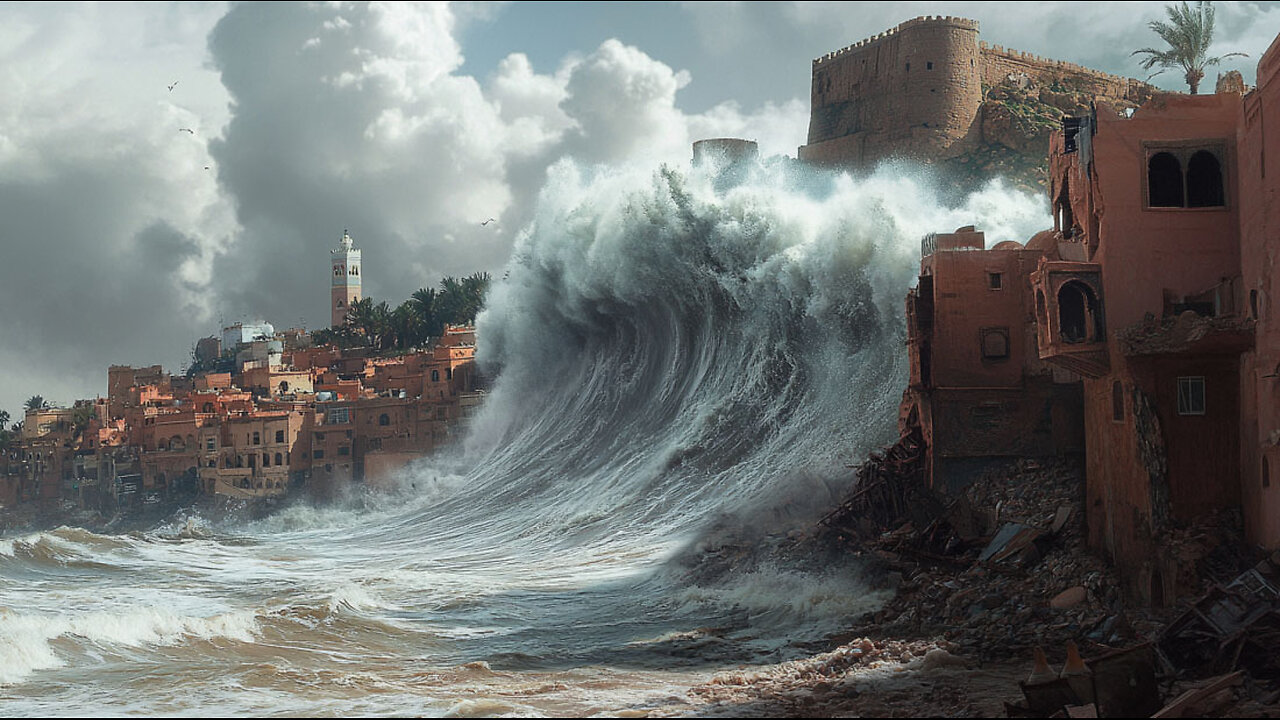Premium Only Content

Morocco and Algeria NOW! Worst Flooding in a Decade. 50x the Monthly Rainfall in One Day!
Extreme rains and thunderstorms hit southern Morocco starting on September 6, causing catastrophic flooding. The disaster claimed the lives of 18 people, with four still missing. The heaviest rains struck regions already experiencing prolonged drought, with some areas facing water shortages for at least six years.
In the town of Tagounite, where the average rainfall for the entire month of September is about 0.12 inches, 6.7 inches fell in just one day. That's more than 50 times the monthly average! A representative from Morocco's Meteorological Service called the event "exceptional."
The provinces of Tata, Tiznit, and Errachidia were hit hardest. At least 56 homes were destroyed, and 110 roads were damaged. Key transportation routes were also paralyzed, complicating evacuations and rescue operations. People were left without water, electricity, and communication. Many animals also perished. A local resident said, "We haven't seen rain like this in about 10 years."
Southwestern Algeria was also struck by severe flooding. The provinces of Béchar, Tamanrasset, El Oued, Ghardaïa, Djanet, Naâma, El Bayadh, Illizi, and Tindouf were affected.
Over a few days, parts of the Algerian Sahara received more rainfall than ever recorded at this time of year. This phenomenon even impacted cities in higher altitudes, such as Saida, Tiaret, and Sidi Bel Abbès.
The floods claimed the lives of at least five people, including children swept away by strong water currents.
Flooding in the valleys damaged national road networks, especially National Road No. 6, connecting the southwest with the northwest, and National Road No. 110 between Béchar and Taghit. Businesses, schools, government buildings, and homes were flooded.
In the district of Aïn Sefra, the Oued River, which runs through the town, overflowed, causing massive floods. Civil Protection workers and volunteers are trying to evacuate families living near the river. It's a challenging mission given the rapid rise in water levels.
As the waters rose quickly, many families found themselves trapped. Fortunately, most were rescued.
The climate situation is worsening not only in African countries but globally. At the international forum "Global Crisis: The Responsibility," measures were discussed to preserve the planet and life on it, calling for the full engagement of humanity's scientific potential. The key task is to unite scientists and create favorable conditions for their work.
However, this will only be possible once politicians, guided by public opinion, make the necessary decisions. The more people are informed and speak out about the issue, the higher the chance it will become a priority.
It’s important to study the changes on the planet and share this information using all available means.
-
 1:40:15
1:40:15
AllatRa TV
9 days agoFuel-Free Generators. Energy of a Free Society
361 -
 6:48:50
6:48:50
Akademiks
9 hours agoKendrick Lamar and SZA disses Drake and BIG AK? HOLD UP! Diddy, Durk, JayZ update. Travis Hunter RUN
112K10 -
 11:45:14
11:45:14
Right Side Broadcasting Network
9 days agoLIVE REPLAY: TPUSA's America Fest Conference: Day Three - 12/21/24
265K26 -
 12:19
12:19
Tundra Tactical
9 hours ago $8.42 earnedDaniel Penny Beats Charges in NYC Subway Killing
36.4K6 -
 29:53
29:53
MYLUNCHBREAK CHANNEL PAGE
1 day agoUnder The Necropolis - Pt 1
92.9K45 -
 2:00:10
2:00:10
Bare Knuckle Fighting Championship
3 days agoCountdown to BKFC on DAZN HOLLYWOOD & FREE LIVE FIGHTS!
45.2K3 -
 2:53:01
2:53:01
Jewels Jones Live ®
1 day agoA MAGA-NIFICENT YEAR | A Political Rendezvous - Ep. 103
111K27 -
 29:54
29:54
Michael Franzese
13 hours agoCan Trump accomplish everything he promised? Piers Morgan Article Breakdown
111K49 -
 2:08:19
2:08:19
Tactical Advisor
17 hours agoThe Vault Room Podcast 006 | Farwell 2024 New Plans for 2025
183K11 -
 34:12
34:12
inspirePlay
1 day ago $5.55 earned🏆 The Grid Championship 2024 – Cass Meyer vs. Kelly Rudney | Epic Battle for Long Drive Glory!
84K8